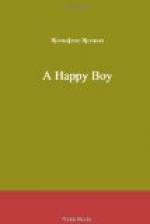“It will never come back any more,” said the boy.
“Dear me! how can that be?”
Oyvind would not confess at once.
“Has the fox carried it off?”
“Oh, I wish it were the fox!”
“You must have lost your senses!” cried the mother. “What has become of the goat?”
“Oh—oh—oh! I was so unlucky. I sold it for a twisted bun!”
The moment he uttered the words he realized what it was to sell the goat for a bun; he had not thought about it before. The mother said,—
“What do you imagine the little goat thinks of you now, since you were willing to sell it for a twisted bun?”
The boy reflected upon this himself, and felt perfectly sure that he never could know happiness more in this world—nor in heaven either, he thought, afterwards.
He was so overwhelmed with sorrow that he promised himself that he would never do anything wrong again,—neither cut the cord of the spinning-wheel, nor let the sheep loose, nor go down to the sea alone. He fell asleep lying there, and he dreamed that the goat had reached heaven. There the Lord was sitting, with a long beard, as in the Catechism, and the goat stood munching at the leaves of a shining tree; but Oyvind sat alone on the roof, and, could get no higher. Then something wet was thrust right against his ear, and he started up. “Ba-a-a-a!” he heard, and it was the goat that had returned to him.
“What! have you come back again?” With these words he sprang up, seized it by the two fore-legs, and danced about with it as if it were a brother. He pulled it by the beard, and was on the point of going in to his mother with it, when he heard some one behind him, and saw the little girl sitting on the greensward beside him. Now he understood the whole thing, and he let go of the goat.
“Is it you who have brought the goat?”
She sat tearing up the grass with her hands, and said, “I was not allowed to keep it; grandfather is up there waiting.”
While the boy stood staring at her, a sharp voice from the road above called, “Well!”
Then she remembered what she had to do: she rose, walked up to Oyvind, thrust one of her dirt-covered hands into his, and, turning her face away, said, “I beg your pardon.”
But then her courage forsook her, and, flinging herself on the goat, she burst into tears.
“I believe you had better keep the goat,” faltered Oyvind, looking away.
“Make haste, now!” said her grandfather, from the hill; and Marit got up and walked, with hesitating feet, upward.
“You have forgotten your garter,” Oyvind shouted after her. She turned and bestowed a glance, first on the garter, then on him. Finally she formed a great resolve, and replied, in a choked voice, “You may keep it.”
He walked up to her, took her by the hand, and said, “I thank you!”
“Oh, there is nothing to thank me for,” she answered, and, drawing a piteous sigh, went on.




